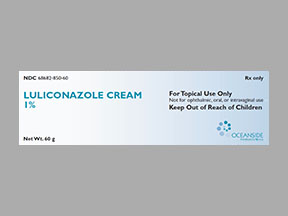
Luliconazole Coupons & Savings Card – Discount Prices from $97.05
Generic for: Luzu
My prescription
Edit
60GM of 1%, Luliconazole (1 Tube)
Select pharmacy

CVS
$167.42
COUPON PRICE
Walgreens
$97.05
COUPON PRICE
Walmart
$188.61
COUPON PRICE
Albertsons
$202.17
COUPON PRICELuliconazole savings card
Show this card to your pharmacist
Walgreens
$97.05
BIN
ID
PCN
GRP
015995
LHKPN681683
GDC
DR33
Powered by
Related azole antifungals prescriptions
More prescriptions for ringworm
Related azole antifungals prescriptions
More prescriptions for ringworm
Price history for Luzu (brand) & Luliconazole (generic)
1 Tube, 60GM
Average retail price for Luzu
Average retail price for Luliconazole
Average SaveHealth price for Luliconazole
Our price history data is based on aggregated prescription data collected from participating pharmacies in America. Our prescription data updates daily to reflect the latest price changes. If you notice a missing data point, it means there wasn't sufficient data available to generate a monetary value for that date.
We analyzed Luliconazole prices for (60GM, 1 Tube) over the last 12 months. The average retail price was $679.93, while the average price using the SaveHealth discount card was $187.56. That's a savings of approximately 72.41% when using our Luliconazole coupon.
Compared to the generic version, Luzu had an average price of $626.83 over the same time period. With the SaveHealth savings card, Luliconazole is 70.08% cheaper on average than Luzu.
*Retail prices are based on pharmacy claims data, and may not be accurate when we don't have enough claims.
Luliconazole dosage forms
Dosage Quantity Price from Per unit 60GM 1 Tube $167.42 $167.42 60GM 2 Tubes $316.55 $158.28 60GM 3 Tubes $473.67 $157.89
| Dosage | Quantity | Price from | Per unit |
|---|---|---|---|
| 60GM | 1 Tube | $167.42 | $167.42 |
| 60GM | 2 Tubes | $316.55 | $158.28 |
| 60GM | 3 Tubes | $473.67 | $157.89 |
Luliconazole Warnings
It is crucial to be informed about the safety and warning information related to the use of this medication. Below are key points to consider:
- Topical Use Only: Luliconazole (Luzu) should be applied solely to the skin. It is essential to avoid contact with the eyes, mouth, or vaginal area, as this may lead to irritation or other adverse effects. In the event of accidental exposure, rinse the affected area thoroughly with water.
Please consult your healthcare provider if you have any questions or concerns regarding the use of this medication.
Luliconazole Side Effects
Common side effects:
- mild skin irritation
- burning at the application site
- stinging at the application site
- redness at the application site
- itchiness at the application site
Less common but important to monitor:
- contact dermatitis
- allergic skin rash
- cellulitis
Serious side effects:
- serious allergic reactions
- severe itching
- hives
- swelling of the face, lips, tongue, or throat
- severe burning
- crusting of the treated skin
- peeling of the treated skin
Luliconazole Interactions
Luliconazole is a topical antifungal medication used to treat skin infections. When applied to the skin, only a small amount enters the bloodstream. However, studies have shown that luliconazole can affect certain liver enzymes, specifically CYP2C19 and CYP3A4, which are involved in processing various medications. This means that luliconazole has the potential to alter the levels of other drugs in your body that rely on these enzymes for metabolism.
For example, in a study where luliconazole was applied daily at a dose of about 4 grams, it increased the blood levels of Omeprazole, a medication used to treat acid reflux, by approximately 30%. This suggests that luliconazole can moderately inhibit the CYP2C19 enzyme. While this effect is considered weak, it could be more pronounced in some individuals, especially when treating larger skin areas or more severe infections.
Given this potential for interaction, it's important to inform your healthcare provider about all the medications you're currently taking, including over-the-counter drugs and supplements. They can assess whether luliconazole might affect the effectiveness or safety of your other treatments and adjust your medication regimen if necessary. Always follow your healthcare provider's instructions and report any unusual symptoms or side effects promptly.
